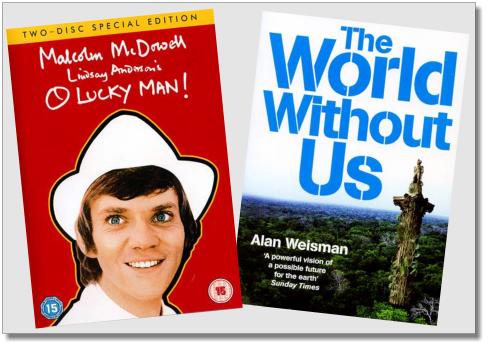2008 — 22 May: Thursday
Flagging, but with energy for another photo. Christa always liked the colour red:
 Christa and our handfull. Early 1980s again
Christa and our handfull. Early 1980s again
G'night! Oh, feel free to check out the refreshed music lists while I snooze and let my database cool down.
Sleepers shatter sleep... dept.
And the night started so well, too. But when Railtrack decide to thump each of their sleepers, one by laborious one, on our little stretch of line — passing the house at about 02:41 — sleep becomes essentially impossible for a (yawn) while. The first time1 they did this, in the mid 1980s, I actually got up and went outside to see what the hell was going on. At least I've learned to relax, as it were.
Now, what had I been going to mention? Oh yes, memory loss:
When older people can no longer remember names at a cocktail party, they tend to think that their brainpower is declining. But a growing number of studies suggest that this assumption is often wrong... the aging brain is simply taking in more data and trying to sift through a clutter of information, often to its long-term benefit.
The BBC has just (08:31) told me cognition enhancers are seen as a problem in the context of school exams. Though coffee is OK, it seems. And Microsoft is bribing online buyers in the US. I liked the comment: "Microsoft is like a bad restaurant — no matter what the incentive, you don't want to eat there. Their product isn't working and their share of the market proves that."
As others see us...
This starts off well, and promises weekly updates. "A well-pulled artisanal ale", indeed! Good luck, Mr Gross. Perhaps he should try Iceland? "The growth of software, biotechnology, financial services, tourism and various other industries has allowed the import of a wide variety of goods, including foodstuffs. But you still get traditional dishes including singed sheep heads and a delicacy of cured ram called scrota. (Don't ask.)"
On that note, breakfast!
Credit where credit's due... dept.
Yet another tedious offer of interest-free credit on card purchases and balance transfers. Thank you, Mr Postie. Why couldn't they offer me all this money back when we actually needed the stuff? Time to go out and spend some. That fridge keeps emptying itself, it seems. A local estate agent is obviously feeling the pinch, too. Keeps asking me if I'm thinking of moving. I find myself curiously unmoved by his (lack of) appeal.
Before I know it, it's 15:31 — lunch was lunched, shopping has been shopped, and wandering through crowded streets in Southampton is (I find) somewhat soothing. If not, there's always this wonderful Doonesbury. I got there from a piece by Ian Ayres on students surfing during lectures with a good joke in the opening paragraph. Some interesting comments, but no fixed conclusions.
I mentioned the delivery of the "O Lucky Man" DVD on Monday, and I limited myself to an interesting paperback today; one that asks (and tries to answer) the question How would the world change if human beings vanished from the earth right now, for good? I also browsed another of those "Coping with bereavement" books to see if I was missing any tricks. ('How To survive bereavement' by Andrea Kon.) I don't seem to be.

Popped over to say "Hi" to Roger and Eileen, and then stuffed in a nice salad and a bit too much Morello cherry pie and custard. Eating efficiently for one is, as I've remarked, sometimes quite tricky. And suddenly, it's 22:08 — my, how Times flies sometimes. My next task is to clear some of my clutter out of Junior's room so he's got somewhere to sleep this weekend. Where the heck am I going to put everything? (Mind you, he can help me get those four cartons of CDs back up into the loft.)
Before bed, what could be nicer than Bob Dylan's Theme Time radio hour while I read Glyn Moody's interview with Mr Ubuntu?
Good God! (No cutting remarks.) Found via Andrew Brown's blog. And this is timely with a bomb in Exeter:
...imagine that you've got a disease that strikes one in a million people, and a test for the disease that's 99% accurate. You administer the test to a million people, and it will be positive for around 10,000 of them — because for every hundred people, it will be wrong once (that's what 99% accurate means). Yet, statistically, we know that there's only one infected person in the entire sample. That means that your "99% accurate" test is wrong 9,999 times out of 10,000!
Terrorism is a lot less common than one in a million and automated "tests" for terrorism — data-mined conclusions drawn from transactions, Oyster cards, bank transfers, travel schedules, etc — are a lot less accurate than 99%. That means practically every person who is branded a terrorist by our data-mining efforts is innocent.